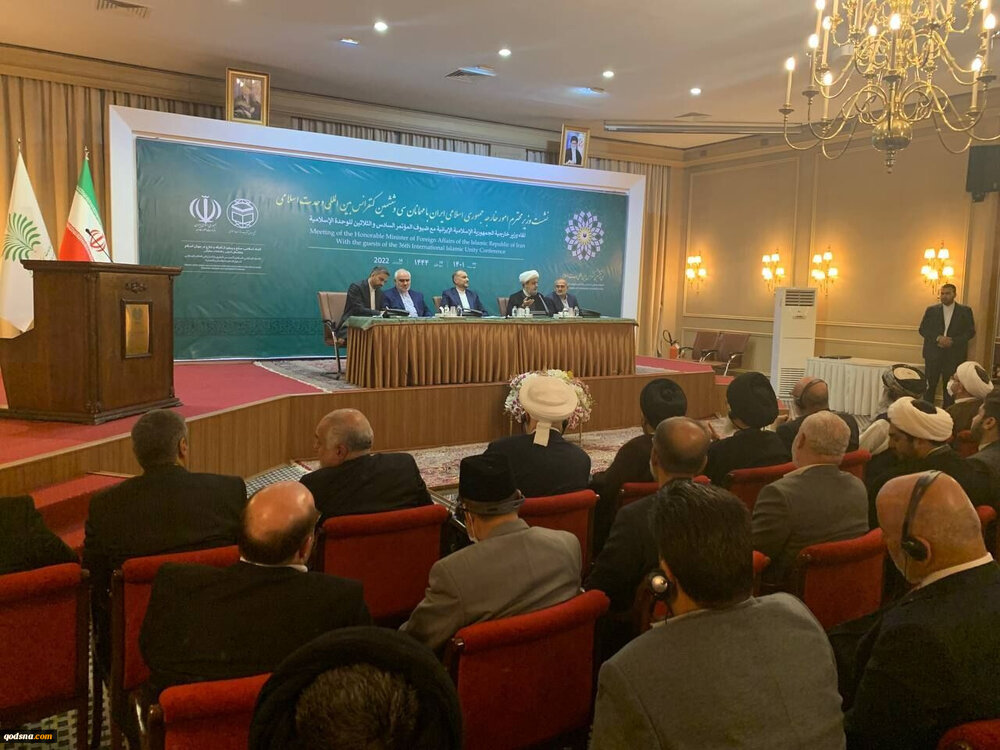Iran FM: West seeks to create rift between Shias and Sunnis

TEHRAN — Iranian Foreign Minister Hossein Amir Abdollahian held a meeting on Friday night with the guests of the 36th International Islamic Unity Conference at the Foreign Ministry Institute for Political and International Studies and Researches.
During the meeting, the top Iranian diplomat welcomed the guests and offered them congratulations on Islamic Unity Week.
He also expressed gratitude for efforts by Hamid Shahriari, the secretary general of the World Forum for Proximity of Islamic Schools of Thought, in hosting the conference.
Amir Abdollahian referred to remarks by the Leader of the Islamic Revolution Ayatollah Seyyed Ali Khamenei in meeting with the participants of the unity conference on Friday morning and elaborated on the tangible manifestation of the enemy’s activities to divide the Shia and Sunni Muslims in the course of Iraq’s occupation by the United States.
In the years of Iraq’s occupation by the U.S. which began in 2003, “strange and unprecedented incidents” took place in order to create a rift between Iraq’s Sunni and Shia Muslims, the minister said.
The foreign minister enumerated examples of the enemy’s attempts to divide Iraqi Shias and Sunnis, saying, “We have witnessed numerous cases of the enemy’s attempts to create a rift among the Islamic Ummah in Yemen, Syria, Iraq, Afghanistan, Palestine, Lebanon, etc.”
“The West sought to ignite sectarian war in Iran”
Pointing to the developments recently unfolding in Iran, the top diplomat added, “Foreign parties have made attempts over the past weeks to exploit a domestic issue and meddle in our country’s affairs.”
“This is while hours after the death of Mahsa Amini, our country’s President called her father, offered sympathy, and ordered a swift investigation to shed light on the issue,” Amir Abdollahian underlined.
“Who can believe that the death of a girl is that important to the Westerners? If it is so, what did they do vis-à-vis hundreds of thousands of martyrs and victims in Iraq, Afghanistan, Syria and Lebanon? They sought to ignite sectarian war in Iran,” the foreign minister said.
“Part of the peaceful demands have been and will be met, but we have witnessed the entry of firearms into the scene of some protests, which have been imported from abroad. We do not have such arms in Iran,” he explained.
“In the mayhem in Zahedan, there was no slogan or picture related to Mahsa. A known terrorist group tried to pit Shias and Sunnis against one another and claimed responsibility for that. They did the same thing in a section of Kurdistan, but the insight of Sunni clerics and people foiled all their attempts,” Amir Abdollahian opined.
Elsewhere in his remarks, Iran’s foreign minister said, “Imam Khomeini has left many legacies for the Muslim Ummah. One of them is Islamic Unity Week and the other one is the designation of International Quds Day.”
“We proudly announce that despite all the pressure by enemies, Iran has provided support to the Shia and Sunni resistance, and even the Christian one in Lebanon the same way as it did in the case of the Hamas and Islamic Jihad resistance movements in Palestine,” he said.
Amir Abdollahian further paid tribute to the late scholars who were present in the previous rounds of the Islamic unity meeting, including Ayatollah Mohammad Ali Taskhiri, and prayed for their soul.
Prior to the foreign minister’s speech, a number of the guests, including Sheikh Khalid al-Mala, head of Iraq’s Sunni scholars Assembly; Sheikh Qazi Hanina, president of Lebanese Muslim Scholars Association; and Muhammad Azmi Abdulhamid, president of the Malaysian Consultative Council of Islamic Organizations, delivered speeches and offered their views on the importance of unity, refraining from divisions, lauded the Islamic Republic of Iran’s efforts to strengthening Muslim unity and vigilance against hostile conspiracies.
Leave a Comment